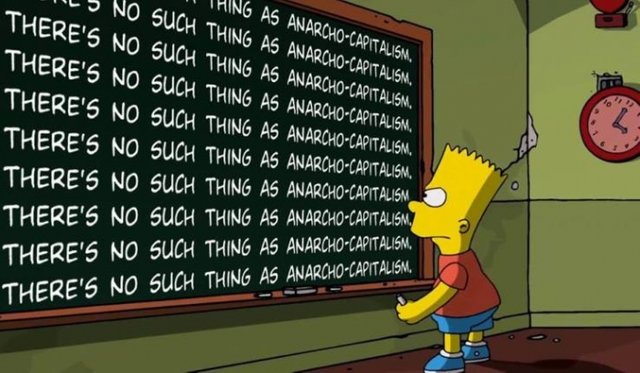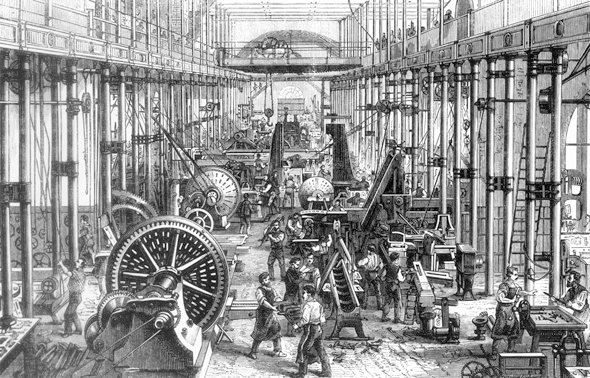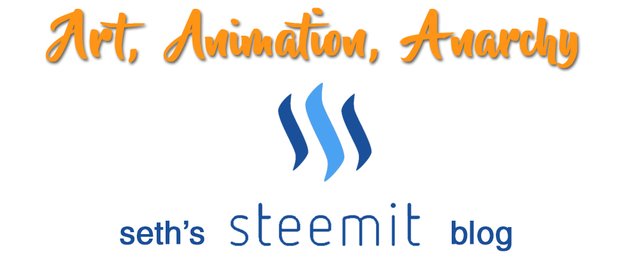Is Anarcho-Capitalism an Oxymoron?
"You're an Anarcho-Capitalist? That's great! I'm a violent pacifist!"
"I'm a meat-eating vegan!"
"And I'm a God-fearing atheist!"
A quick Google image search of the term "Anarcho-Capitalism" yielded all sorts of memes criticizing the oxymoronic nature of the term.

Like so.
Anyone who identifies as an anarchist, of any form, has surely heard the arguments:
There can't be true anarchy unless the people own the means of production.
Capitalism creates hierarchy, the opposite of anarchy!
Private property is slavery!
I'm a big fan of trying to work through arguments rationally and without mudslinging, so I'm going to try to do that here. Many anarchists who throw these statements at Anarcho-Capitalists try to treat the latter as if they're unbelievably stupid for not realizing how contradictory their views are. But An-Caps obviously don't see it that way.
This big divide in understanding can primarily be attributed to three terms:
- Capitalism
- Hierarchy
- Property
The opposing camps have such different understandings of these terms that when they argue against each other, they are often arguing about completely different things. I'm going to try to straighten things out a bit.
What is Capitalism?
Here are three similar definitions. It's definitions like these that someone arguing against Anarcho-Capitalism will often go to:
- An economic and political system in which a country's trade and industry are controlled by private owners for profit, rather than by the state.
- The economic ideal under which anyone may aspire to ownership of the means of production.
- an economic system characterized by private ownership of capital goods, by investments that are determined by private decision, and by prices, production, and the distribution of goods that are determined mainly by competition in a free market.
These definitions all have to do with power and ownership. An Anarcho-Communist will use these definitions to prove that capitalism, even without "government" will always lead to fascism, with the haves ruling over the have-nots.
The Anarcho-Capitalist usually operates on a different, more straight-forward definition of "capitalism":
- The free market
It's that simple for an An-Cap. Capitalism is not a system, and it doesn't necessarily have anything to do with power. It's freedom for individuals to trade.
The concept of freedom to trade is not inherently opposed to anarchy. Trade is not an oppressive action, and if you're going to try to argue that it is and that it should be stopped, you will be committing tyranny against all human interaction. Trade happens all the time, with or without money, resources, or products. Trade happens implicitly and explicitly in all relationships. Using currency or resources to facilitate trade does not change it's moral neutrality.
What is Hierarchy?

hi·er·ar·chy
/ˈhī(ə)ˌrärkē/
noun
- a system or organization in which people or groups are ranked one above the other
Unlike with capitalism, An-Caps and An-Coms don't disagree over the definition of this term. The issue is that one camp believes all hierarchy is fundamentally immoral and cannot exist in true anarchy, while the other does not.
For the Anarcho-Communist, it's simple. The word "anarchy" literally means "no rulers." Any "archy" is to be abolished.
For the Anarcho-Capitalist, it's a little different and a little more difficult to explain. Even though the word "hierarchy" contains "archy", it doesn't have to describe a system of rulers and subjects per se. The An-Cap believes that as long as a relationship is voluntary, it doesn't matter if one person is ranked above another. It isn't slavery if any party can walk away at any time. I can voluntarily trade my labour in exchange for money on the terms that I follow someone else's instructions. That's voluntary hierarchy. No one was ruled over, no one became a slave, all parties agreed to the arrangement.
What is Property?

Many Anarcho-Capitalisms don't realize that Anarcho-Communists make a distinction between private property and possession. Many An-Coms don't seem to understand that An-Caps make no distinction. Without understanding the other camp's terms, discussion and debate is meaningless.
Private Property is a "legal" claim to something. One can be considered to own that something under law or contract until he trades it away.
Possession is ownership based on use. One can only claim to own things that they use personally.
Communists are fine with the latter but consider the former to be immoral. It's the existence of private property that leads to corporate overlords ruling over their factory wage slaves, getting rich off the work of others.
As I said before, Anarcho-Capitalists see no distinction between the two terms. I find the distinction to be arbitrary and illogical. This is because it's impossible to draw a clear line between property and possession even under the definitions above. Allow me to borrow an illustration from @larkenrose:
A hypothetical scenario and a few questions for "anarcho-communists": You and I are on an island. I spend hours making a bow and arrow which can be used to catch fish from a pond on the island. That bow and arrow is therefore "the means of production."
1) Does your "need" for the use of the bow and arrow give you the SAME claim on it that I have from me MAKING it?
2) Did I oppress you by making something you don't have, thereby creating "inequality"?
3) If I offer to let you borrow my bow if we split 50/50 any fish you catch with it, am I oppressing you by making that offer?
4) Given the chance, would you call me an evil exploiter capitalist, kill me, and claim my bow in the name of the collective (which at that point would just be you)?
Even if I alter this scenario and lend my neighbor the bow and arrow with no strings attached, is it still my possession? I'm not making personal use of this item, it has become the means of production for someone else's work. Is it immoral for me to continue owning the thing that I built? Or is it only immoral if I make its use conditional like in Larken's point #3?
Anarcho-Capitalists see no distinction between private property and possessions because it doesn't make logical sense to separate the two.
One Final Note
Before I close, I want to talk briefly about the idea of "wage slavery". Many socialists and communists will claim that having to work in order to make enough money to survive is a form of slavery. This type of slavery is, of course, blamed on capitalism.
But guess what? Even without money, without hierarchical jobs, without private ownership of the means of production, you would still need to work to survive.
That's not the oppression of capitalism. That's the oppression of nature.
If you didn't figure it out by now, my answer is NO. I do not think Anarcho-Capitalism is an oxymoron.
~***~
Thanks for reading! I look forward to being fiercely criticized in the comments by any Socialists or Communists who are using this platform.
Be sure to stay tuned for tomorrow's post, Is Anarcho-Communism an Oxymoron?
~Seth

Nice post. For a second there, I thought I was going to have to argue that it is not an oxy-moron lol
I'd also add that an anarcho-communist society/commune/etc could exist within the framework of an ancap society. Conversely, an ancap group would have to be ejected from an ancom society.
@freebornangel thinks that a communist society is not "imposing your will onto people" and social manipulation to achieve such a society is ok, as is theft/redistribution.
Much like a parasite can live within a host, but a host can not live within a parasite ;)
Your second point is very astute. I'm going to get into that a bit with tomorrows post.
Cool. Looking forward to it.
This article made my day, thank you so much for putting in the time to construct this so well. Your format and timing made the conclusion all the better and for me much more enjoyable. I started in angrily and progressively was just filled with more and more joy as the arguments forming in my mind to counter this or that where deliciously woven in. Bravo.
Thank you so much! This comment made my day.
This is a fantastic piece of work.
You could have thrown in f*cking for virginity but that may be rude so I'll do it.
Seriously though I enjoyed the piece and have followed to ensure I don't miss the next instalment.
@tremendospercy
Ah! That one is so obvious. I can't believe I missed it. Maybe I'll put it into tomorrow's post about Anarcho-Communism. Thanks for the idea and thanks for following!
I prefer the Voluntarist/Voluntaryist view because I think it more accurately describes where I am coming from.
Primarily I detest coercion and violence. Capitalism is more the result of letting people be free than an end goal in itself IMO.
I too prefer to identify as a Voluntaryist. Under the Voluntaryist ideology, one could be a capitalist, a mutualist, a communist, whatever they want so long as they don't force anyone else into it.
Thanks for the comment.
So, I consider myself a socialist, but no anarchist. I agree with almost everything you said, there is also stuff I just did not know about the anracho ideologies. I remember that I first thought the idea of anarcho-capitalism is ridiculous when I heard about it years ago. It's pretty much thanks to Ron Paulm and @dwinblood that I see how this can also be a very social approach.
The danger I see of course and I think I share that with the anarchistic comrades is that many companies today are in fact states with their own laws and cultures. To get rid of these we would need to put rules on the market, which is directly oposing the idea of anracistic capitalism.
That is not true though. UBI alone would make it possible to seperate work/creativity from survival, which is the reason I am in favor of UBI. As a society we should be advanced enough to garantuee protection from hunger and other existential threats.
Thank you for commenting civilly. I don't often see such civil disagreement on the internet!
By UBI, I'm assuming you mean Universal Basic Income, correct? The problem is that wealth doesn't come from thin air. Someone has to work to produce the income that will be redistributed. Someone has to work to produce resources that everybody needs to survive.
I have no problem with the idea "from each according to his ability to each according to his needs" so long as it isn't accomplished by force. If people voluntarily wish to band together and pool their resources to produce a UBI for those less fortunate, that's fine. But with government, it's accomplished by the threat of violence. That's how everything is accomplished by government.
I think the problem lies within our government and how a state is currently run. The state is supposed to serve the people, today it is the other way around. There is no state that is truly controlled by its people, but that does not mean it is impossible, especially with information technology we have nowadays.
I am big fan of @dwinblood's post and I have a lot of sympathy for the volunteristic approach, but I also see a lot of flaws in anarchistic ideologies in general. It is a topic I plan to post about at some point.
Is one of his arguments I actually dont like to be made against me. Mainly because I never claimed that the state can just produce "free" wealth for its people. Everything has its price in life, I am well aware of this ever present fact.
To me everybody should be free to contribute as much to society as he wants and it should be rewarded to do so. I just don't want people creating their own states in my state via their monetary power and the existential threat to employees is a tool for that.
I understand where you're coming from. However, I don't think it's a matter of how the government is currently run. No matter what, governments run on violence or the threat of violence. Even if they're properly representing "the people."
There's no such thing as "the people" as a whole, so some people will get what they want and other people won't. Those who don't get what they want will have to follow the rules laid down by the majority, or else.
That's why I believe in Voluntaryism. All human interaction should be voluntary. But force could still be used in self defense, and that includes defense against "people creating their own states in [your] state via their monetary power and the existential threat to employees"
I know we're coming at these issues from totally different foundations so it might be difficult to take this conversation much further. If you're interested in learning more about Voluntaryist/anarchist philosophy, I would recommend Larken Rose's book The Most Dangerous Superstition.
This is an exceptional article. You can go ahead and just ignore my other comment. I shouldn't have been so haste to write it. Everything I wanted to say you said one hundred times better. So ignore a foolish moment of mine where I gave into haste and ego.
Damn good piece, and it is definitely getting resteemed.
Upvoting your comment, since it was your resteem that led me to the article.
Lol don't worry about it. I've written many responses in haste without actually reading what I was responding to. Thanks for the comment(s).
My pleasure. I am not kidding on the exceptional article. I'll state it is likely one of my favorites I've read in some time.
Wow! Thank you so much.
Great breakdown of the argument. Thank you!
Thanks for the comment! Cheers.
Great post! I wrote a post about the rising tide of Marxism, its history, and what drives its functions. I think you might like it. Please check it out: https://steemit.com/freedom/@ericarthurblair/global-mind-virus
I'll check it out. Thanks!
I guess anarcho-capitalism is pretty much everyone for himself / herself and everything is fair game. So, Gangster's Paradise.
I get the reference lol.
It doesn't have to be everyone for himself. It just means no one will be forced to do anything. If people want to create support systems or help others as individuals, they are free to do so.
I agree.
Caps get $185, Commis $6 .... that is the problem! :D
Thanks for explaining these interesting ideologies!
Lol capitalism is makin' me rich. Communism, not so much. Thanks for commenting!